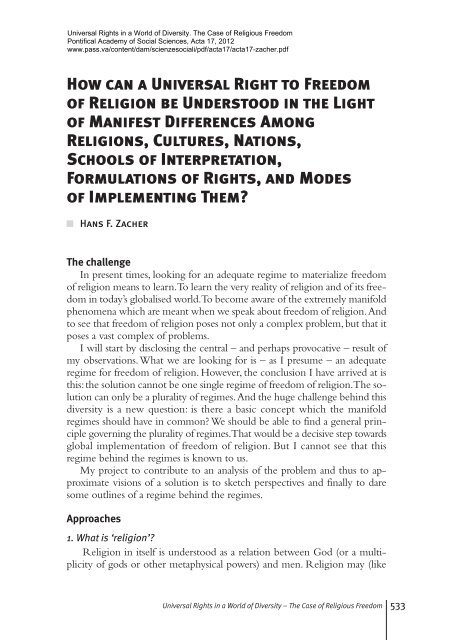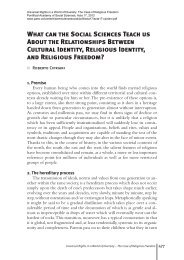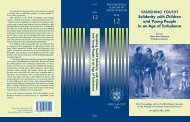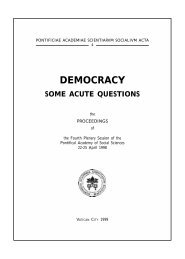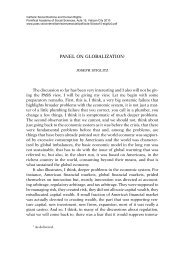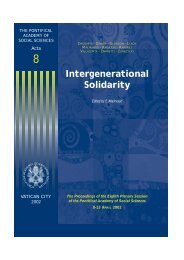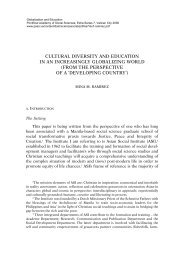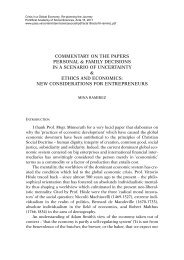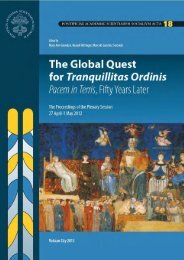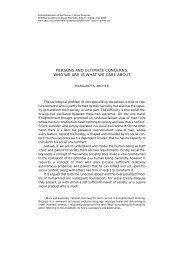How can a Universal Right to Freedom of Religion be Understood in ...
How can a Universal Right to Freedom of Religion be Understood in ...
How can a Universal Right to Freedom of Religion be Understood in ...
Create successful ePaper yourself
Turn your PDF publications into a flip-book with our unique Google optimized e-Paper software.
<strong>Universal</strong> <strong>Right</strong>s <strong>in</strong> a World <strong>of</strong> Diversity. The Case <strong>of</strong> Religious <strong>Freedom</strong>Pontifical Academy <strong>of</strong> Social Sciences, Acta 17, 2012www.pass.va/content/dam/scienzesociali/pdf/acta17/acta17-zacher.pdf<strong>How</strong> <strong>can</strong> a <strong>Universal</strong> <strong>Right</strong> <strong>to</strong> <strong>Freedom</strong><strong>of</strong> <strong>Religion</strong> <strong>be</strong> Unders<strong>to</strong>od <strong>in</strong> the Ligh<strong>to</strong>f Manifest Differences Among<strong>Religion</strong>s, Cultures, Nations,Schools <strong>of</strong> Interpretation,Formulations <strong>of</strong> <strong>Right</strong>s, and Modes<strong>of</strong> Implement<strong>in</strong>g Them?Hans F. ZacherThe challengeIn present times, look<strong>in</strong>g for an adequate regime <strong>to</strong> materialize freedom<strong>of</strong> religion means <strong>to</strong> learn. To learn the very reality <strong>of</strong> religion and <strong>of</strong> its freedom<strong>in</strong> <strong>to</strong>day’s globalised world. To <strong>be</strong>come aware <strong>of</strong> the extremely manifoldphenomena which are meant when we speak about freedom <strong>of</strong> religion. And<strong>to</strong> see that freedom <strong>of</strong> religion poses not only a complex problem, but that itposes a vast complex <strong>of</strong> problems.I will start by disclos<strong>in</strong>g the central – and perhaps provocative – result <strong>of</strong>my observations. What we are look<strong>in</strong>g for is – as I presume – an adequateregime for freedom <strong>of</strong> religion. <strong>How</strong>ever, the conclusion I have arrived at isthis: the solution <strong>can</strong>not <strong>be</strong> one s<strong>in</strong>gle regime <strong>of</strong> freedom <strong>of</strong> religion. The solution<strong>can</strong> only <strong>be</strong> a plurality <strong>of</strong> regimes. And the huge challenge <strong>be</strong>h<strong>in</strong>d thisdiversity is a new question: is there a basic concept which the manifoldregimes should have <strong>in</strong> common? We should <strong>be</strong> able <strong>to</strong> f<strong>in</strong>d a general pr<strong>in</strong>ciplegovern<strong>in</strong>g the plurality <strong>of</strong> regimes. That would <strong>be</strong> a decisive step <strong>to</strong>wardsglobal implementation <strong>of</strong> freedom <strong>of</strong> religion. But I <strong>can</strong>not see that thisregime <strong>be</strong>h<strong>in</strong>d the regimes is known <strong>to</strong> us.My project <strong>to</strong> contribute <strong>to</strong> an analysis <strong>of</strong> the problem and thus <strong>to</strong> approximatevisions <strong>of</strong> a solution is <strong>to</strong> sketch perspectives and f<strong>in</strong>ally <strong>to</strong> daresome outl<strong>in</strong>es <strong>of</strong> a regime <strong>be</strong>h<strong>in</strong>d the regimes.Approaches1. What is ‘religion’?<strong>Religion</strong> <strong>in</strong> itself is unders<strong>to</strong>od as a relation <strong>be</strong>tween God (or a multiplicity<strong>of</strong> gods or other metaphysical powers) and men. <strong>Religion</strong> may (like<strong>Universal</strong> <strong>Right</strong>s <strong>in</strong> a World <strong>of</strong> Diversity – The Case <strong>of</strong> Religious <strong>Freedom</strong>533
HANS F. ZACHER<strong>in</strong> Buddhism) also <strong>be</strong> experienced as the comprehensive <strong>in</strong>sight <strong>in</strong><strong>to</strong> a nonpersonalmetaphysical reality. <strong>Religion</strong> <strong>in</strong> itself thus is a phenomenon <strong>of</strong> transcendentreality. ‘<strong>Religion</strong>’ however is also a name for that what men th<strong>in</strong>k,feel and do if they live on the basis <strong>of</strong> their religion. Ins<strong>of</strong>ar religion is a phenomenon<strong>of</strong> earthly reality.2. <strong>Religion</strong> as a transcendent and a social phenomenonHuman rights are a central means <strong>to</strong> regulate human coexistence – <strong>in</strong>other words: they are a central means <strong>to</strong> regulate social life. Among humanrights however freedom <strong>of</strong> religion has a very peculiar position. It perta<strong>in</strong>s<strong>to</strong> human life <strong>in</strong> its earthly, terrestrial dimension as well as <strong>in</strong> its transcendent,spiritual dimension. Ins<strong>of</strong>ar as social life is human life and the terrestrialdimension <strong>of</strong> human life <strong>can</strong>not <strong>be</strong> separated from the human potential<strong>to</strong> participate <strong>in</strong> transcendent spiritual life, social life also <strong>in</strong>cludes the transcendent,spiritual element. But human participation <strong>in</strong> transcendent life<strong>can</strong> neither <strong>be</strong> observed or assessed, nor conditioned or <strong>in</strong>fluenced as it <strong>can</strong><strong>be</strong> done with human participation <strong>in</strong> secular reality. What is thought ordone relat<strong>in</strong>g <strong>to</strong> social life has <strong>to</strong> respect the potential <strong>of</strong> spiritual life. Butit is impossible and even forbidden <strong>to</strong> presume or <strong>to</strong> ascerta<strong>in</strong> its reality. Forthe regulation <strong>of</strong> human life, the transcendent reality is therefore <strong>of</strong> veryrelative relevance.If freedom <strong>of</strong> religion is concerned, though, the constellation changes. To<strong>be</strong> the scope <strong>of</strong> a right <strong>to</strong> freedom, religion has <strong>to</strong> <strong>be</strong> taken as someth<strong>in</strong>g whichis socially real – as a social phenomenon: constitut<strong>in</strong>g and shap<strong>in</strong>g relations<strong>be</strong>tween men. But when look<strong>in</strong>g at religion as a reality, we cross a criticalboundary. What God (or any other metaphysical power) is, th<strong>in</strong>ks, wants, recommendsor commands or what that non-personal metaphysical reality is, isknown only through the <strong>in</strong>termediation <strong>of</strong> human <strong>be</strong><strong>in</strong>gs. This makes religionopen for uncerta<strong>in</strong>ty and variety, but also for any k<strong>in</strong>d <strong>of</strong> assertion <strong>of</strong> def<strong>in</strong>itiveness.The possibilities <strong>of</strong> def<strong>in</strong><strong>in</strong>g religion are endlessly manifold. And endlesslymanifold are also the human <strong>be</strong><strong>in</strong>gs whose teach<strong>in</strong>gs create the largeamount <strong>of</strong> doctr<strong>in</strong>es and advice: the great founders who orig<strong>in</strong>ally communicatethe substance <strong>of</strong> a religion; the great leaders who develop the doctr<strong>in</strong>e,who perhaps also split up a community and def<strong>in</strong>e the peculiarities <strong>of</strong> newdenom<strong>in</strong>ations, sects etc.; the bishops, scholars, priests, preachers, m<strong>in</strong>isters whotransport the assets <strong>of</strong> the religion from past <strong>to</strong> future. But <strong>be</strong>sides all these realitiescreated by various leaders, the reality <strong>of</strong> a religion also exists by virtue<strong>of</strong> all the <strong>be</strong>lievers who <strong>in</strong>evitably have their own, their highly <strong>in</strong>dividual picture<strong>of</strong> god as well as their personal selection <strong>of</strong> the teach<strong>in</strong>g – <strong>be</strong> that with<strong>in</strong>or without a church or any other form <strong>of</strong> religious community.534 <strong>Universal</strong> <strong>Right</strong>s <strong>in</strong> a World <strong>of</strong> Diversity – The Case <strong>of</strong> Religious <strong>Freedom</strong>
HOW CAN A UNIVERSAL RIGHT TO FREEDOM OF RELIGION BE UNDERSTOOD3. The <strong>in</strong>dividual right – the right <strong>to</strong> collectivity and au<strong>to</strong>nomyIn legal terms this means that freedom <strong>of</strong> religion has two sides: the <strong>in</strong>dividualone and the collective one. The <strong>in</strong>dividual one is very close <strong>to</strong> freedom<strong>of</strong> thought and freedom <strong>of</strong> conscience. It makes religion potentially omnipresentand the shape <strong>of</strong> religion endlessly variable – <strong>in</strong>clud<strong>in</strong>g dim<strong>in</strong>utionand disappearance. The public articulation <strong>of</strong> common convictions or religion-borne<strong>in</strong>terests is amorphous, as mass-actions generally are. The collectiveside is the basis <strong>of</strong> religious communities and thus the basis <strong>of</strong> otherextremely important ways <strong>of</strong> manifestation <strong>of</strong> religion: the common tradition<strong>of</strong> <strong>be</strong>lief, the common exchange <strong>of</strong> avowal, the common implementation <strong>of</strong>rites and services and so on. Beyond that, collective freedom <strong>of</strong> religion isborne by an elementary human condition: the desire <strong>to</strong> experience religionas someth<strong>in</strong>g that is not restricted <strong>to</strong> oneself but that we have <strong>in</strong> commonwith others – as someth<strong>in</strong>g that is perhaps universal, that is an <strong>in</strong>evitable truth.The downside is: religion as a source <strong>of</strong> truth is a hope; the plurality <strong>of</strong> religionsis a reality. That is the difference <strong>be</strong>tween the truth <strong>of</strong> religion and thetruth which <strong>can</strong> <strong>in</strong>terpersonally govern our practical life.Realised <strong>in</strong> a collective way, freedom <strong>of</strong> <strong>be</strong>lief enters special fields <strong>of</strong> tension.On the one hand, there is the tension <strong>be</strong>tween the <strong>in</strong>dividual freedom <strong>of</strong> religionand the collective freedom <strong>of</strong> religion. The <strong>in</strong>dividual, who is a mem<strong>be</strong>r<strong>of</strong> a religious community from a general human po<strong>in</strong>t <strong>of</strong> view, keeps his orher <strong>in</strong>dividual freedom <strong>of</strong> religion. If transgress<strong>in</strong>g certa<strong>in</strong> limits <strong>of</strong> <strong>to</strong>lerancethe community might blame the dissident for apostasy, for heresy or for schism,might punish or expel or even kill him or her. Or the dissident will split thecommunity or leave it. On the other hand, there is the possible tension <strong>be</strong>tweencollective freedom <strong>of</strong> religion and the <strong>in</strong>volvement <strong>in</strong> other social units– <strong>be</strong> they k<strong>in</strong>smanlike, pr<strong>of</strong>essional, commercial, political or anyth<strong>in</strong>g similar.4. Believers and non-<strong>be</strong>lieversModern societies do not simply consist <strong>of</strong> <strong>be</strong>lievers and non-<strong>be</strong>lievers.There are many variations and facets <strong>be</strong>tween. There are, for example, religiouslydistanced people who want <strong>to</strong> keep their options open – <strong>in</strong> order <strong>to</strong>identify or not <strong>to</strong> identify themselves depend<strong>in</strong>g on the situation. They allshare the freedom <strong>of</strong> religion. In the event <strong>of</strong> dispute, they claim a ‘negativefreedom <strong>of</strong> religion’. And normally it will not <strong>be</strong> refused. The reasons arevarious: it may <strong>be</strong> due <strong>to</strong> the <strong>in</strong>tensive connectivity <strong>be</strong>tween the freedom <strong>of</strong>religion, freedom <strong>of</strong> conscience and freedom <strong>of</strong> thought; the difficulty <strong>to</strong> discern<strong>be</strong>tween a positive and a negative freedom <strong>of</strong> religion; the secular improvability<strong>of</strong> the elements <strong>of</strong> religion; f<strong>in</strong>ally the democratic un<strong>in</strong>telligibility<strong>of</strong> an essential legal difference <strong>be</strong>tween <strong>be</strong>lievers and non-<strong>be</strong>lievers.<strong>Universal</strong> <strong>Right</strong>s <strong>in</strong> a World <strong>of</strong> Diversity – The Case <strong>of</strong> Religious <strong>Freedom</strong>535
HANS F. ZACHERThe social reality <strong>of</strong> freedom <strong>of</strong> religion is, however, signifi<strong>can</strong>tly dist<strong>in</strong>guishedand characterised by this equaliz<strong>in</strong>g coexistence <strong>of</strong> freedom <strong>of</strong> <strong>be</strong>liefand freedom <strong>of</strong> non-<strong>be</strong>lief – and, what is even more important, an <strong>in</strong>def<strong>in</strong>itenum<strong>be</strong>r <strong>of</strong> variations <strong>be</strong>tween them. <strong>Freedom</strong> <strong>of</strong> religion is normally manifestedthrough community mem<strong>be</strong>rship and community build<strong>in</strong>g, a specialform <strong>of</strong> organisation, common rites and services, and f<strong>in</strong>ally through the <strong>in</strong>vocation<strong>of</strong> God or some other transcendent reality as an argument for thesolution <strong>to</strong> pr<strong>of</strong>ane problems. <strong>Freedom</strong> <strong>of</strong> religion applied <strong>to</strong> non-<strong>be</strong>lievers,<strong>in</strong> contrast, does normally not <strong>in</strong>volve build<strong>in</strong>g or jo<strong>in</strong><strong>in</strong>g communities – itis rather a matter <strong>of</strong> <strong>in</strong>dividual life, <strong>of</strong> families or groups <strong>of</strong> personal likem<strong>in</strong>dedfriends; it is not exercised through a special form <strong>of</strong> organisation; notthrough common rites and services; and on the other hand arguments forthe solution <strong>of</strong> social problems are concentrated on secular ones. After all: thesocial freedom <strong>of</strong> religion for <strong>be</strong>lievers regularly goes along with visibilityand constancy; freedom <strong>of</strong> religion for non-<strong>be</strong>lievers, however, primarilymeans <strong>in</strong>visibility and a maximum <strong>of</strong> flexibility.Exceptions <strong>to</strong> these rules are not excluded, however. There may <strong>be</strong> groupsshar<strong>in</strong>g common convictions and attitudes, and perhaps also feel<strong>in</strong>g the mission<strong>to</strong> spread these. And the way <strong>to</strong> develop and <strong>to</strong> unfold them may <strong>be</strong>similar <strong>to</strong> the way religious groups exercise their rights. Especially militantatheists may choose correspond<strong>in</strong>g paths.5. Constellations <strong>of</strong> religious congruencies and differences with<strong>in</strong> commonspaces <strong>of</strong> social livea) <strong>Religion</strong> and non-religion as an element <strong>of</strong> liv<strong>in</strong>g <strong>to</strong>getherThe phenomena <strong>of</strong> freedom <strong>of</strong> religion materialize <strong>in</strong> a confus<strong>in</strong>g diversity<strong>of</strong> levels, spaces, directions etc.– As <strong>in</strong>dividual relations and collective relations as well as the position <strong>of</strong><strong>in</strong>dividuals amidst a collectivity.– In peaceful parallel existence <strong>of</strong> strangeness and restriction or <strong>of</strong> harmony,respect and cooperation or <strong>in</strong> contempt, hostility, strife and war.– Through the different arenas where groups <strong>of</strong> people meet: religious arenasformed by disputes <strong>be</strong>tween the religious leaders and/or the followers <strong>of</strong>one and the same denom<strong>in</strong>ation; social arenas like the ones constituted byracial or ethnic conflicts, by economic circumstances, by standards <strong>of</strong> education,by liv<strong>in</strong>g terri<strong>to</strong>ry, by the traces left by his<strong>to</strong>ry etc., if religiousdifferences come along with social differences or cross the latter. Sometimes– and not all <strong>to</strong>o rarely – political parties or other systems <strong>of</strong> politicalrivalry are arenas for political disputes.536 <strong>Universal</strong> <strong>Right</strong>s <strong>in</strong> a World <strong>of</strong> Diversity – The Case <strong>of</strong> Religious <strong>Freedom</strong>
HOW CAN A UNIVERSAL RIGHT TO FREEDOM OF RELIGION BE UNDERSTOOD– Through the means <strong>of</strong> implement<strong>in</strong>g relations. On the positive, peacefulside this <strong>in</strong>volves the exchange <strong>of</strong> <strong>in</strong>formation, <strong>be</strong>com<strong>in</strong>g acqua<strong>in</strong>ted witheach other, common enterprises and experiences, mutual assistance. Onthe negative, hostile side this means the block<strong>in</strong>g <strong>of</strong> <strong>in</strong>formation, spread<strong>in</strong>g<strong>of</strong> wrong <strong>in</strong>formation or negative arguments and judgements; discrim<strong>in</strong>ationand exclusion from access <strong>to</strong> goods; material aggression turnedaga<strong>in</strong>st churches, temples, houses <strong>of</strong> priests or followers and vented throughdestruction; f<strong>in</strong>ally personal <strong>in</strong>fr<strong>in</strong>gement such as deportation, imprisonment,<strong>to</strong>rture, bodily harm, kill<strong>in</strong>g, and the ext<strong>in</strong>ction <strong>of</strong> the <strong>be</strong>liev<strong>in</strong>g.– Dist<strong>in</strong>guish<strong>in</strong>g themselves by the transcendent realities which the followers<strong>be</strong>lieve <strong>in</strong>, by the consequences which they draw for their religious practicesand/or for their pr<strong>of</strong>ane ways <strong>of</strong> life, or f<strong>in</strong>ally by the consequenceswhich they draw for the life <strong>of</strong> the whole society, the general public, thestate and its law.b) Is freedom <strong>of</strong> religion only a freedom or also a common good?<strong>Religion</strong> and non-religion are an omnipresent potential for condition<strong>in</strong>ghuman liv<strong>in</strong>g <strong>to</strong>gether. <strong>Freedom</strong> <strong>of</strong> religion therefore could and should <strong>in</strong>cludethe responsibility for freedom <strong>of</strong> religion <strong>of</strong> the respective other ones.Any k<strong>in</strong>d <strong>of</strong> freedom <strong>can</strong> only exist with<strong>in</strong> a common order applicable <strong>to</strong> allthe subjects who are able <strong>to</strong> make use <strong>of</strong> it. <strong>Freedom</strong> which is not general,which is not for everyone but reserved for one person or a selection <strong>of</strong> entitledpersons only, is not freedom. It is dom<strong>in</strong>ation. Th<strong>in</strong>k <strong>of</strong> property right orthe freedom <strong>of</strong> commerce which are a priori <strong>to</strong> <strong>be</strong> unders<strong>to</strong>od as <strong>be</strong><strong>in</strong>g subject<strong>to</strong> legal regulation. <strong>Freedom</strong> is only possible with<strong>in</strong> the framework <strong>of</strong>mutuality – multilateral mutuality, reciprocity, a fact that those who make use<strong>of</strong> freedom <strong>of</strong> religion are normally not aware <strong>of</strong>. The background is that religionis felt <strong>to</strong> <strong>be</strong> a participation <strong>in</strong> truth. Thus freedom <strong>of</strong> religion meansresponsibility for truth: responsibility for the communication <strong>of</strong> truth; responsibilityfor the implementation <strong>of</strong> truth through the <strong>in</strong>dividual and throughsocial life. <strong>Freedom</strong> <strong>of</strong> religion thus tends <strong>to</strong> spread the truth, <strong>to</strong> make truthgenerally accepted, <strong>to</strong> make truth <strong>to</strong> <strong>be</strong> followed. That may <strong>be</strong> similar withfreedom <strong>of</strong> conscience or freedom <strong>of</strong> thought. But no other freedom sharesthis essential connection with truth. The use <strong>of</strong> other freedoms <strong>can</strong> <strong>be</strong> subject<strong>to</strong> compromise. The message <strong>of</strong> truth is unable <strong>to</strong> accept a compromise.That was also true <strong>in</strong> times, and under circumstances, when <strong>in</strong> certa<strong>in</strong> societiesand states only one religion was present. Then it was normally neglected,however. It disregarded the possibility <strong>of</strong> <strong>in</strong>dividual disagreement.Th<strong>in</strong>k <strong>of</strong> the most elaborated practice <strong>of</strong> <strong>in</strong>quisition at the height <strong>of</strong> the EuropeanMiddle Ages, when the Church stated the difference <strong>be</strong>tween the <strong>in</strong>-<strong>Universal</strong> <strong>Right</strong>s <strong>in</strong> a World <strong>of</strong> Diversity – The Case <strong>of</strong> Religious <strong>Freedom</strong>537
HANS F. ZACHERdividual conviction and the <strong>of</strong>ficial teach<strong>in</strong>g <strong>of</strong> the Catholic truth, and thestate excluded the dissident from society. The Peace <strong>of</strong> Westphalia still stuck<strong>to</strong> this way <strong>of</strong> th<strong>in</strong>k<strong>in</strong>g – by ‘moderniz<strong>in</strong>g’ the implementation. Only whendissidents themselves founded the Ameri<strong>can</strong> states and f<strong>in</strong>ally the UnitedStates, the soil <strong>of</strong> a new paradigm entered the ‘Western world’. But until nowno mature philosophy <strong>of</strong> coexistence <strong>of</strong> different religion-borne ‘truths’ has<strong>be</strong>en generally accepted. The development <strong>of</strong> a philosophy <strong>of</strong> pluralism whichoptimizes the chances <strong>of</strong> religion-borne ‘truths’ <strong>to</strong> <strong>be</strong> respected and listened<strong>to</strong> is a decisive precondition for the prosperity <strong>of</strong> freedom <strong>of</strong> religion.That means that religious communities and thus also and especially theCatholic Church have <strong>to</strong> withstand severe tensions with<strong>in</strong> themselves. Onthe one hand they are the trustees <strong>of</strong> the truth which they <strong>to</strong>ok and cont<strong>in</strong>ue<strong>to</strong> take out <strong>of</strong> their transcendent background. They are responsible for spread<strong>in</strong>gout ‘their’ truth over the whole <strong>of</strong> mank<strong>in</strong>d. On the other hand they willand <strong>can</strong>not expect that freedom <strong>of</strong> religion <strong>can</strong> prosper or even only prosperfor the message <strong>of</strong> one religion, <strong>of</strong> one community.They have <strong>to</strong> understandthat the future <strong>of</strong> the freedom <strong>of</strong> religion will only survive and prosper as acommon good <strong>of</strong> all religions. And not only that: they also have <strong>to</strong> tell thesecular part <strong>of</strong> mank<strong>in</strong>d that freedom <strong>of</strong> religion is also an <strong>in</strong>tegral part <strong>of</strong>their world – that ‘their’ freedom <strong>of</strong> thought and ‘their’ freedom <strong>of</strong> consciencewill not survive and even not prosper if mank<strong>in</strong>d is <strong>be</strong>reft <strong>of</strong> freedom <strong>of</strong> religion.To achieve that, it will <strong>be</strong> essential <strong>to</strong> differentiate <strong>be</strong>tween the transcendentreality <strong>of</strong> eternal life and the social reality <strong>of</strong> earthly life.6. The responsibility <strong>of</strong> the statea) DiversitiesThe greatest responsibility for guarantee<strong>in</strong>g the freedom <strong>of</strong> religion andfor controll<strong>in</strong>g the conflicts and dangers which go along with it lies with thestate. It has the responsibility <strong>to</strong> arrange a peaceful, free, safe and sufficient lifefor its citizens or other people who live <strong>in</strong> its terri<strong>to</strong>ry. Assum<strong>in</strong>g that not all<strong>of</strong> the people share the same religion (nor even the same <strong>in</strong>terpretation and/orpractice <strong>of</strong> the respective religions) means: the state has the responsibility <strong>to</strong>develop a commonwealth on the basis <strong>of</strong> various contradictions:– Contradictions <strong>be</strong>tween a concept <strong>of</strong> human life, state and society whichis based on purely human reason<strong>in</strong>g and agreement on the one hand, anda concept <strong>of</strong> state, society and human life which is also based on the religiousmessage about the state, society and human life on the other hand;– Contradictions <strong>be</strong>tween the different religious messages about human life,state and society;538 <strong>Universal</strong> <strong>Right</strong>s <strong>in</strong> a World <strong>of</strong> Diversity – The Case <strong>of</strong> Religious <strong>Freedom</strong>
HOW CAN A UNIVERSAL RIGHT TO FREEDOM OF RELIGION BE UNDERSTOOD– And contradictions <strong>be</strong>tween the different humanist concepts <strong>of</strong> humanlife, state and society.In addition there is another series <strong>of</strong> contradictions. It starts with the <strong>in</strong>nermostmanifestations <strong>of</strong> religion: the organisation <strong>of</strong> religious communities,the common worship and service, the rites etc. Supposed that freedom <strong>of</strong> religionis accepted, there should normally <strong>be</strong> no conflict. But exceptions <strong>can</strong>arise.– The religious manifestations <strong>of</strong> one religious community <strong>can</strong> come <strong>in</strong><strong>to</strong>conflict with religious manifestations <strong>of</strong> one or more other religiouscommunities;– The religious manifestations <strong>of</strong> a religious community <strong>can</strong> come <strong>in</strong><strong>to</strong>conflict with <strong>in</strong>dividual spheres <strong>of</strong> freedom <strong>of</strong> religion, conscience and/orthought;– Or – and that is the most frequent case – the manifestation comes <strong>in</strong><strong>to</strong>conflict with basic values or goods <strong>of</strong> the state and the civil society.Apparently, a concept which <strong>of</strong>fsets all these contradictions is not possible,and the conclusion that the religious messages are <strong>to</strong> <strong>be</strong> disregarded seems <strong>to</strong><strong>be</strong> obvious <strong>to</strong> some people. The start<strong>in</strong>g assumption for them is: all men haveand experience a relation <strong>to</strong> earthly reality; but not all men discern and accepta transcendent reality. Thus – that is the conclusion – <strong>to</strong> <strong>be</strong> aware <strong>of</strong> the earthlyreality is the common character <strong>of</strong> men. The consciousness <strong>of</strong> transcendentreality <strong>in</strong> contrast is a potential for disturbance. Therefore it should <strong>be</strong> neglectedas an <strong>in</strong>dividual, ‘private’ risk. This would, however, disregard the essentialmean<strong>in</strong>g <strong>of</strong> freedom <strong>of</strong> religion: that human existence <strong>can</strong> <strong>be</strong> tracedback <strong>to</strong> a transcendent reality. This is a capacity which no one <strong>can</strong> <strong>be</strong> deniedand which no one <strong>can</strong> <strong>be</strong> supposed <strong>to</strong> never feel. To view one’s own lifeaga<strong>in</strong>st the transcendent background or <strong>to</strong> deny it, is the true asset <strong>of</strong> freedom<strong>of</strong> religion, as well as the correspond<strong>in</strong>g right <strong>of</strong> <strong>in</strong>dividual choice. Thus nosolution is allowed that excludes from long<strong>in</strong>g <strong>to</strong> th<strong>in</strong>k about a transcendentreality dur<strong>in</strong>g one’s life, from long<strong>in</strong>g <strong>to</strong> feel it. The burden <strong>to</strong> live with contradictionsand <strong>to</strong> give them a <strong>be</strong>arable, <strong>to</strong>lerable structure persists.b) Essays on solutionsHere we <strong>to</strong>uch upon the core challenge <strong>of</strong> freedom <strong>of</strong> religion. It wouldnot <strong>be</strong> fair <strong>to</strong> claim the availability <strong>of</strong> easy solutions. What is most necessaryis <strong>to</strong> get ahead with more satisfy<strong>in</strong>g ways <strong>to</strong> render freedom <strong>of</strong> religion possibleunder the condition <strong>of</strong> diversity and contradiction. Let us look <strong>be</strong>h<strong>in</strong>dthe matters <strong>of</strong> course, which we quickly have <strong>in</strong> m<strong>in</strong>d when we talk aboutfreedom <strong>of</strong> religion. These matters <strong>of</strong> course are mostly shaped by familiarity,by our country, by our time, by the opposition <strong>of</strong> a general religious public<strong>Universal</strong> <strong>Right</strong>s <strong>in</strong> a World <strong>of</strong> Diversity – The Case <strong>of</strong> Religious <strong>Freedom</strong>539
HANS F. ZACHERand non-religious <strong>in</strong>dividuals, perhaps also by the opposition <strong>of</strong> an atheistmajority and a religious m<strong>in</strong>ority. But <strong>in</strong> what country are th<strong>in</strong>gs <strong>to</strong>day asthey were when we were children? And we all are afraid that th<strong>in</strong>gs will havechanged even more the day after <strong>to</strong>morrow. We need deeper go<strong>in</strong>g views, aricher s<strong>to</strong>ck <strong>of</strong> construction elements and a <strong>be</strong>tter knowledge <strong>of</strong> their effects.I will, however, risk some hypotheses:– The state is the most general trustee for freedom <strong>of</strong> religion. As the statedoes not identify itself with a religion (or a non-religious analogy <strong>of</strong> that),it is the last resort <strong>to</strong> protect the <strong>in</strong>dividual freedom <strong>of</strong> religion;– The state has the responsibility <strong>to</strong> arrange a peaceful, equal, free, safe andsufficient life for all its citizens and <strong>in</strong>habitants. <strong>Freedom</strong> <strong>of</strong> religion mustnot violate these values. Individuals and communities which exist or atleast act on the basis <strong>of</strong> the freedom <strong>of</strong> religion are obliged <strong>to</strong> respect theother citizens’ and <strong>in</strong>habitants’ rights <strong>to</strong> a peaceful, equal, free, safe and sufficientlife. They are also obliged <strong>to</strong> respect other <strong>in</strong>dividuals’ and communities’freedom <strong>of</strong> religion;– Collective freedom <strong>of</strong> religion must not <strong>be</strong> bartered for a regime <strong>of</strong> <strong>in</strong>dividualfreedom <strong>of</strong> religion only. <strong>Freedom</strong> <strong>of</strong> religion must not <strong>be</strong> bartered for aregime <strong>of</strong> freedom <strong>of</strong> conscience and freedom <strong>of</strong> thought only. From thevery <strong>be</strong>g<strong>in</strong>n<strong>in</strong>g the right was granted as a right <strong>to</strong> ‘freedom <strong>of</strong> religion’ – asa right <strong>in</strong> favour <strong>of</strong> the persecuted <strong>be</strong>lievers, not as a right <strong>to</strong> ‘freedom fromreligion’ or as a ‘right <strong>of</strong> non-religion’. To see human life not only <strong>in</strong> its socialrealness but also <strong>in</strong> a transcendent realness is an essential human habitus. Andthere is no other right <strong>to</strong> protect it <strong>in</strong> a way that freedom <strong>of</strong> religion does;– <strong>Freedom</strong> <strong>of</strong> religion does not mean that all religions <strong>in</strong> one and the samecountry have the same space <strong>to</strong> unfold <strong>in</strong> any context. Culture, the num<strong>be</strong>rand distribution <strong>of</strong> followers and similar social circumstances and particularitiesmay play a role regard<strong>in</strong>g differentiation. His<strong>to</strong>ry and traditionwill certa<strong>in</strong>ly <strong>be</strong> strong arguments. But not only the changes <strong>of</strong> the presentand even more <strong>of</strong> the past teach us that the future has <strong>to</strong> stay open. Thepast is not a downright lawmaker for the future practise <strong>of</strong> the freedom <strong>of</strong>religion. <strong>Freedom</strong> <strong>of</strong> religion is a vital right <strong>of</strong> every new generation. Limitedimbalances <strong>be</strong>tween religions or religious communities are especially<strong>to</strong>lerable if they improve the peaceful liv<strong>in</strong>g <strong>to</strong>gether <strong>of</strong> a plurality <strong>of</strong> religionsas well as the liv<strong>in</strong>g <strong>to</strong>gether <strong>of</strong> religious communities, religiouspeople and the secular population;– But it certa<strong>in</strong>ly means that all religions share a regular basic position whichdeserves the name ‘freedom’;– The au<strong>to</strong>nomy <strong>of</strong> religious communities gives none <strong>of</strong> their authoritiesthe unlimited power <strong>to</strong> condition and <strong>to</strong> control the life <strong>of</strong> their mem<strong>be</strong>rs.540 <strong>Universal</strong> <strong>Right</strong>s <strong>in</strong> a World <strong>of</strong> Diversity – The Case <strong>of</strong> Religious <strong>Freedom</strong>
HOW CAN A UNIVERSAL RIGHT TO FREEDOM OF RELIGION BE UNDERSTOODThe general responsibility <strong>of</strong> the state for a peaceful, equal, free and sufficientlife <strong>can</strong> limit the au<strong>to</strong>nomy <strong>of</strong> religious communities;– In order <strong>to</strong> achieve equality for all, law is the key competence <strong>of</strong> the state.To acknowledge law as national law only <strong>be</strong>cause it is unders<strong>to</strong>od as ‘God’swill’ by one or more religious communities violates the responsibility <strong>of</strong> thestate for all its citizens and <strong>in</strong>habitants. That is equally true for the hand<strong>in</strong>gover <strong>of</strong> the adm<strong>in</strong>istration <strong>of</strong> the law <strong>to</strong> authorities <strong>of</strong> a religious communityor a group <strong>of</strong> religious communities.c) Ways <strong>of</strong> implementationThese layers <strong>of</strong> analysis show how far the way from the legal word<strong>in</strong>g <strong>of</strong>‘freedom <strong>of</strong> religion’ <strong>to</strong> operational rules is. Judicial work deal<strong>in</strong>g with casesby <strong>in</strong>terpret<strong>in</strong>g some words <strong>in</strong> a constitution or an <strong>in</strong>ternational treaty may<strong>of</strong>ten <strong>be</strong> <strong>to</strong>o simple, <strong>to</strong>o undifferentiated, much less open for variety or futuredevelopment, <strong>to</strong>o surpris<strong>in</strong>g <strong>to</strong> <strong>be</strong> accepted. On the other hand, political decisionsthrough democratic legislation may, for <strong>in</strong>stance, <strong>be</strong> <strong>to</strong>o <strong>in</strong>fluenced bytactics <strong>to</strong> keep the political power or <strong>to</strong> arrive at it and <strong>to</strong>o limited <strong>to</strong> weighup the scope <strong>of</strong> possible solutions. Certa<strong>in</strong>ly, laws and court decisions are irreplaceable.But the necessity <strong>to</strong> complement the <strong>in</strong>struments is obvious:– To make the real diversity <strong>of</strong> circumstances visible by comparative studies;– To enhance and <strong>in</strong>tensify the s<strong>to</strong>ck <strong>of</strong> experiences by observa<strong>to</strong>ries;– To approximate consensus by discussion and agreement through barga<strong>in</strong><strong>in</strong>g;– To facilitate the acceptance <strong>of</strong> new arrangements by it<strong>in</strong>erary approaches;– To accompany practices by moni<strong>to</strong>r<strong>in</strong>g;– To accompany developments by counsell<strong>in</strong>g, etc.7. Theocracies and <strong>to</strong>talitarian states: the absolute problemStates are the most important trustees <strong>of</strong> human rights. They are especiallyalso the most important trustees <strong>of</strong> the freedom <strong>of</strong> religion. And law is themost important means <strong>to</strong> materialize this responsibility. Tak<strong>in</strong>g on this responsibilityis impossible for <strong>to</strong>talitarian states. They refuse freedom <strong>of</strong> religion.And it <strong>can</strong> also <strong>be</strong> impossible for theocracies. In the case <strong>of</strong> theocracies, however,th<strong>in</strong>gs may <strong>be</strong> gradually different.Totalitarian states negate a transcendent reality – especially if the transcendentreality is a religious one, and even more if it is bound <strong>to</strong> a religiouscommunity which may question the absolute leadership <strong>of</strong> the ruler or therul<strong>in</strong>g group. In pr<strong>in</strong>ciple this means that <strong>to</strong>talitarian states negate the socialrelevance <strong>of</strong> a transcendent background <strong>of</strong> any person’s life. Whoever bases amanifestation <strong>of</strong> his or her personality on a banned transcendent ground, excludeshim or herself from the full participation <strong>in</strong> the <strong>to</strong>talitarian common-<strong>Universal</strong> <strong>Right</strong>s <strong>in</strong> a World <strong>of</strong> Diversity – The Case <strong>of</strong> Religious <strong>Freedom</strong>541
HANS F. ZACHERwealth. And every <strong>in</strong>clusion <strong>in</strong> a <strong>to</strong>talitarian commonwealth supposes andcommands that transcendent aspects are excluded from <strong>be</strong><strong>in</strong>g relevant. Thereactions <strong>to</strong> resistance may <strong>be</strong> various and go from kill<strong>in</strong>g, deportation andimprisonment <strong>to</strong> different grades <strong>of</strong> discrim<strong>in</strong>ation. But for followers <strong>of</strong> abanned <strong>be</strong>lief, <strong>of</strong> banned <strong>be</strong>lieves or – as the circumstances may <strong>be</strong> – <strong>of</strong> anysocially relevant <strong>be</strong>lief <strong>in</strong> a transcendent reality, full equality with other citizensand <strong>in</strong>habitants is impossible.Theocracies, on the other hand, privilege one religion and exclude allthe others from full participation: both <strong>be</strong>lievers <strong>of</strong> other religions and non<strong>be</strong>lievers.There may also <strong>be</strong> differences <strong>in</strong> the <strong>in</strong>tensity and the perfectness<strong>of</strong> the exclusion as well as differences <strong>in</strong> the degrees <strong>of</strong> the exclusion orderedby <strong>to</strong>talitarian states. But there is one extreme constellation: if law is unders<strong>to</strong>od<strong>to</strong> <strong>be</strong> directly given by God and if the judges or similar <strong>of</strong>ficials whoadm<strong>in</strong>ister the law are unders<strong>to</strong>od <strong>to</strong> <strong>be</strong> commissioned and authorized byGod. Law is man-made. And it should <strong>be</strong> the rational result <strong>of</strong> a process <strong>of</strong>human exchange <strong>of</strong> op<strong>in</strong>ions. Religious th<strong>in</strong>k<strong>in</strong>g may <strong>be</strong> one <strong>of</strong> the sources<strong>to</strong> f<strong>in</strong>d good legal rules and good legal decisions. But as law is man-made andthe adm<strong>in</strong>istration <strong>of</strong> the law is a human mandate, everyone who is confrontedwith law and the courts <strong>in</strong> his or her understand<strong>in</strong>g <strong>of</strong> the law mightfollow his own conviction – <strong>be</strong> it his own religion, his own morale, his ownrationality. The supposition that the law is ‘God’s word’ and that the judges orsimilar <strong>of</strong>ficials are God’s commissioners deprives the people concerned <strong>of</strong>their human <strong>in</strong>dependence and compels them <strong>to</strong> <strong>be</strong> o<strong>be</strong>dient <strong>to</strong> a God whois not ‘their’ God and <strong>to</strong> respect the authority <strong>of</strong> the judges as a div<strong>in</strong>e mandatewhich <strong>can</strong> only <strong>be</strong> based on a religion which is not ‘theirs’.Al<strong>to</strong>gether, there is a deep and very important rift <strong>be</strong>tween <strong>to</strong>talitarianstates and theocracies on the one hand and more or less li<strong>be</strong>ral, more or lessconstitutional states on the other hand. This difference is commonly characterisedby an essential <strong>in</strong><strong>to</strong>lerance aga<strong>in</strong>st religion and a resolved read<strong>in</strong>ess fora religiously or anti-religiously rooted <strong>in</strong>equality.Some consequences for the global world1. The comprehensive relevance <strong>of</strong> ‘globality’a) Terri<strong>to</strong>rial ‘globality’ versus his<strong>to</strong>rical ‘globality’To get ahead with materializ<strong>in</strong>g freedom <strong>of</strong> religion <strong>in</strong> a globalized world,it is urgently necessary <strong>to</strong> understand ‘global’ not only <strong>in</strong> terms <strong>of</strong> a geographical,terri<strong>to</strong>rial mean<strong>in</strong>g. And not only as a phenomenon <strong>of</strong> geography, communication,traffic etc. It is necessary <strong>to</strong> realise ‘global’ as the ever morecomplete, more <strong>in</strong>tensive self-detection <strong>of</strong> mank<strong>in</strong>d: mank<strong>in</strong>d as an entirety;542 <strong>Universal</strong> <strong>Right</strong>s <strong>in</strong> a World <strong>of</strong> Diversity – The Case <strong>of</strong> Religious <strong>Freedom</strong>
HOW CAN A UNIVERSAL RIGHT TO FREEDOM OF RELIGION BE UNDERSTOODnot only as the entirety <strong>of</strong> the population liv<strong>in</strong>g <strong>to</strong>day, but also as an entiretyover the his<strong>to</strong>ry, from the first <strong>be</strong><strong>in</strong>gs who deserved the name ‘man’ <strong>to</strong> thisvery day. What was religion throughout all these thousands <strong>of</strong> years? Throughoutall the multifariousness <strong>of</strong> human civilisations and cultures? In presenttimes – unlike any other time <strong>in</strong> the past – men know so much about theirhis<strong>to</strong>ry. Men also know more about religion than <strong>be</strong>fore – about the visions<strong>of</strong> transcendent reality and about the social reality <strong>of</strong> religion. People knowabout the manifestations <strong>of</strong> religion at very different times at very differentplaces. And people ask: is that God’s world all <strong>to</strong>gether? Are those all God’schildren? And if not, what then is the mean<strong>in</strong>g <strong>of</strong> the different ways for theequal children? Or are children a priori unequal? Over the centuries, whenth<strong>in</strong>k<strong>in</strong>g <strong>of</strong> religion, people knew only one religion or a very limited multiplicity<strong>of</strong> religions. And they knew religion only as one and the same religion,across all eras they experienced or they remem<strong>be</strong>red one step <strong>of</strong> developmen<strong>to</strong>r a few steps. Now the world his<strong>to</strong>ry <strong>of</strong> religion teaches them how <strong>of</strong>tenreligions come and go, split up or get unified.But not only that. They also know about Christianity from Christ’s birthonwards: throughout the different times, <strong>in</strong> the different places, as the manychurches, the denom<strong>in</strong>ations, the many other particular units. They evenknow about the many manifestations shown by the Catholic Church overtime, <strong>in</strong> the diverse places, under such various conditions. And they ask themselvesaga<strong>in</strong>: why so many ways, so many changes? Are not all men God’schildren? Why should not all their ways <strong>be</strong> God’s ways? And what does thatessential challenge mean for freedom <strong>of</strong> religion? Who is allowed <strong>to</strong> make adifference <strong>be</strong>tween religion and religion, and when? Who is entitled <strong>to</strong> requiresacrifices if the ‘right’ way was failed?b) The lessons <strong>of</strong> his<strong>to</strong>ryThe lessons taught by the his<strong>to</strong>ry <strong>of</strong> mank<strong>in</strong>d are impressive – and unambiguous.On the one hand there is clear evidence that men have always lived onreligious ground. Not all men. But religion <strong>in</strong> pr<strong>in</strong>ciple has always <strong>be</strong>en importantas a framework <strong>of</strong> human life. Regard<strong>in</strong>g the his<strong>to</strong>ry <strong>of</strong> mank<strong>in</strong>d, thesecular claim that the religious ground <strong>of</strong> human life could get lost or <strong>be</strong>comeirrelevant looks va<strong>in</strong>.On the other hand, we see that the landscape <strong>of</strong> religions has changed allthe time. Even Christianity has changed all the time. And the whole picture<strong>of</strong> religions has <strong>be</strong>en develop<strong>in</strong>g all the time. There is an extreme difference<strong>be</strong>tween the self-conception <strong>of</strong> religions <strong>of</strong> <strong>be</strong><strong>in</strong>g absolute and his<strong>to</strong>rical reality.And also the self-conception <strong>of</strong> a religion <strong>of</strong> <strong>be</strong><strong>in</strong>g the right one and<strong>Universal</strong> <strong>Right</strong>s <strong>in</strong> a World <strong>of</strong> Diversity – The Case <strong>of</strong> Religious <strong>Freedom</strong>543
HANS F. ZACHERthe only right one <strong>be</strong>comes extremely relative. No one <strong>can</strong> dispute that claim<strong>to</strong> <strong>be</strong> legitimate <strong>in</strong> itself: <strong>to</strong> <strong>be</strong> communicated by the community and <strong>to</strong> <strong>be</strong><strong>be</strong>lieved by the followers. But no one from outside is entitled <strong>to</strong> confer thistitle or <strong>to</strong> deny it.Thus we observe a very complex situation. <strong>Religion</strong> is a human capacity, ahuman potential, a human habitus, is a conditio humana. But religions as phenomenaare noth<strong>in</strong>g absolute. Each <strong>of</strong> them may develop itself and will probablydevelop itself. The <strong>be</strong>lievers experience ‘their’ religion <strong>in</strong> a certa<strong>in</strong> situation, ata certa<strong>in</strong> time. But any other <strong>be</strong>liever may experience it <strong>in</strong> a very different way.2. International governancea) The <strong>in</strong>stitutional difficultiesThere is one consequence which is irrefutable: freedom <strong>of</strong> religion.<strong>Freedom</strong> <strong>of</strong> religion for everybody. And freedom <strong>of</strong> religion as a commongood for the world. But what ways <strong>to</strong> materialise that are the right ones,and what ways the wrong ones? What <strong>can</strong> the formulation <strong>of</strong> one fundamentalright mean? One sees how important the concrete situation is: thesituation <strong>of</strong> a state, the situation <strong>of</strong> a civil society, sometimes the situation<strong>of</strong> a region, an ethnic community etc. The distance from the formula <strong>of</strong> auniversal formula <strong>to</strong> the reality <strong>of</strong> national, regional etc. life is extreme. Andso is the distance from one court <strong>of</strong> human rights <strong>to</strong> the reality <strong>of</strong> vernacularreality. Are global m<strong>in</strong>imalia possible? Are global directives possible <strong>in</strong> order<strong>to</strong> lead particulate practices and regulations? It is necessary <strong>to</strong> detect thecomplexity <strong>of</strong> situations which jeopardize, violate or <strong>can</strong>cel freedom <strong>of</strong> religion;and it is necessary <strong>to</strong> detect the whole complexity <strong>of</strong> the ways <strong>to</strong>grant and <strong>to</strong> guarantee freedom <strong>of</strong> religion.With respect <strong>to</strong> foster<strong>in</strong>g the s<strong>to</strong>ck <strong>of</strong> knowledge and experiences <strong>of</strong> thedoctr<strong>in</strong>e, the legal regulation and the practice <strong>of</strong> freedom <strong>of</strong> religion is thereforealso a common responsibility <strong>of</strong> all states that want <strong>to</strong> <strong>in</strong>tegrate freedom<strong>of</strong> religion, as well as <strong>of</strong> all religious communities. Develop<strong>in</strong>g the pr<strong>of</strong>iciency<strong>to</strong> <strong>in</strong>terpret and practise freedom <strong>of</strong> religion <strong>in</strong> order <strong>to</strong> improve for <strong>in</strong>stancethe regulations and practice or <strong>to</strong> adapt them <strong>to</strong> the chang<strong>in</strong>g structures andmentalities <strong>of</strong> the populations, their convictions and their attitudes etc., islikewise a common bus<strong>in</strong>ess for states and religious bodies. This <strong>in</strong> fact means<strong>to</strong> also engage <strong>in</strong> the activities recommended above for the national situation– comparative studies, observa<strong>to</strong>ries, reports about procedures like barga<strong>in</strong><strong>in</strong>g,it<strong>in</strong>erary approaches, moni<strong>to</strong>r<strong>in</strong>g <strong>of</strong> the practice, accompany<strong>in</strong>g developmentsby counsell<strong>in</strong>g – <strong>in</strong> order <strong>to</strong> arrange them on a global level. A transnationalor an <strong>in</strong>ternational agency <strong>to</strong> care for that is <strong>to</strong> <strong>be</strong> strongly advocated.544 <strong>Universal</strong> <strong>Right</strong>s <strong>in</strong> a World <strong>of</strong> Diversity – The Case <strong>of</strong> Religious <strong>Freedom</strong>
HOW CAN A UNIVERSAL RIGHT TO FREEDOM OF RELIGION BE UNDERSTOODb) The split worldTo <strong>be</strong> honest, however, one important aspect <strong>of</strong> the reality <strong>of</strong> this worldhas <strong>to</strong> <strong>be</strong> regarded: the division <strong>of</strong> the world <strong>in</strong><strong>to</strong> ‘li<strong>be</strong>ral’ states on the onehand and <strong>to</strong>talitarian states and theocracies on the other hand. In the framework<strong>of</strong> the United Nations the concern for freedom <strong>of</strong> religion causes adilemma. Global governance requires an <strong>in</strong>stitution <strong>in</strong> which all nations participate.And that representation is only effective if the nations act throughtheir governments. Thus the United Nations are an assembly <strong>of</strong> governmentsregardless <strong>of</strong> whether the states (and their governments) are <strong>in</strong> favour <strong>of</strong> freedom<strong>of</strong> religion or aga<strong>in</strong>st it. And <strong>in</strong> fact <strong>in</strong> the United Nations theocraciesand <strong>to</strong>talitarian states have a strong vote.<strong>Freedom</strong> <strong>of</strong> religion thus is a value which we <strong>can</strong>not trust <strong>to</strong> <strong>be</strong> unequivocallydeveloped and defended by the United Nations. A separate Organisationshould therefore <strong>be</strong> discussed. Such a solution is not unusual. Thereare also other values which <strong>to</strong> foster and <strong>to</strong> develop only some <strong>of</strong> the statesand governments are <strong>in</strong>terested <strong>in</strong>tensely enough. For <strong>in</strong>stance the organisationsdevelop<strong>in</strong>g the market economy. The organisation could probably not<strong>be</strong> built with<strong>in</strong> the UN-framework. But there are other ways available.Whether a group <strong>of</strong> especially <strong>in</strong>volved states arrange a separate <strong>in</strong>ternationalOrganisation, whether non-governmental agents (presumably churches andother religious communities) or whether a type <strong>of</strong> private law corporation is<strong>to</strong> <strong>be</strong> used, <strong>can</strong>not <strong>be</strong> reflected here.An <strong>in</strong>ternational <strong>in</strong>stitution run by the states that really want <strong>to</strong> arrangefor freedom <strong>of</strong> religion or that at least <strong>to</strong>lerate it and that, <strong>in</strong> any case, <strong>of</strong>ferfull and equal participation <strong>in</strong> the commonwealth without any reservationaga<strong>in</strong>st religious people, could <strong>be</strong> the basis <strong>of</strong> an <strong>in</strong>ternational seed<strong>be</strong>d forconcepts <strong>of</strong> freedom <strong>of</strong> religion. It could <strong>be</strong> a place for collect<strong>in</strong>g materialsabout facts, regulations, <strong>in</strong>stitutions and practices. It could <strong>be</strong> a framework forscholarly research. Political strategies there could <strong>be</strong> discussed. Any experiencescould <strong>be</strong> exchanged and discussed. Experts could get acqua<strong>in</strong>ted witheach other. Thus also personal resources could <strong>be</strong> developed. The expertise<strong>to</strong> optimise freedom <strong>of</strong> religion could <strong>be</strong> strengthened.The global challenge <strong>of</strong> religion requires a global culture <strong>of</strong> freedom <strong>of</strong>religion. In this endeavour the Catholic Church should take a strong role –<strong>in</strong> giv<strong>in</strong>g and tak<strong>in</strong>g.<strong>Universal</strong> <strong>Right</strong>s <strong>in</strong> a World <strong>of</strong> Diversity – The Case <strong>of</strong> Religious <strong>Freedom</strong>545


